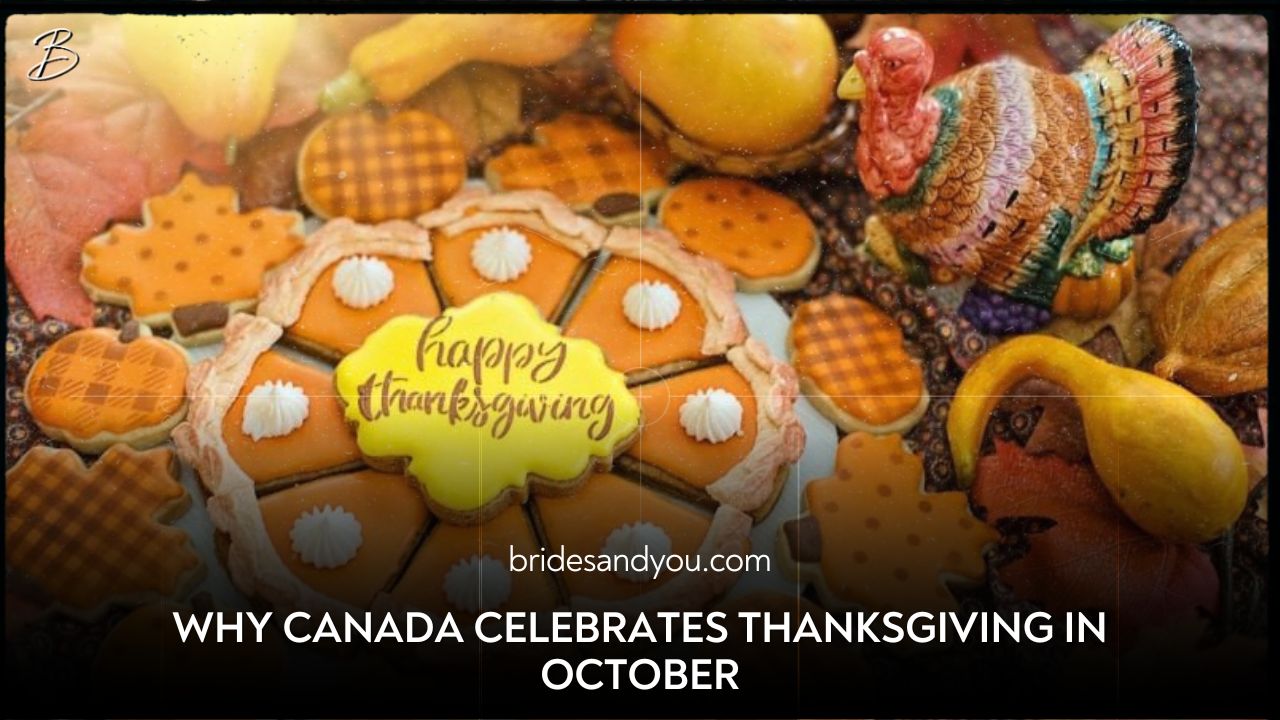Now Reading: WHY CANADA CELEBRATES THANKSGIVING IN OCTOBER
-
01
WHY CANADA CELEBRATES THANKSGIVING IN OCTOBER
WHY CANADA CELEBRATES THANKSGIVING IN OCTOBER

While Americans celebrate Thanksgiving on the fourth Thursday of November, Canadians mark the holiday on the second Monday of October, which this year is October 14. To shed light on the reasoning behind this earlier date, we spoke with Andrew McIntosh, senior subject editor at the Canadian Encyclopedia.
The earlier celebration is largely due to Canada’s climate. “Winter arrives much sooner in Canada, leading to an earlier fall harvest,” McIntosh explains. Historically, Canadian Thanksgiving has focused on celebrating the harvest and giving thanks for the bounty before the cold sets in. The date was officially established as the second Monday in October in 1957, when the weather remains pleasant for outdoor activities.
However, the origins of the holiday go back even further. The first official Canadian Thanksgiving occurred in 1879, though its date varied for years. “Parliament would determine the exact date annually, often with themes centered around celebrating the monarchy,” McIntosh adds. Interestingly, Canadian Thanksgiving has occasionally coincided with American Thanksgiving and, in some years, has even fallen as late as December.
Modern Celebrations
Today, many Canadians choose to celebrate on the Sunday before the official holiday, providing extra travel time for those heading home for the long weekend. The traditional Thanksgiving menu in Canada closely resembles that of the U.S.
“Canadians have largely adopted the traditional Thanksgiving dinner from America,” McIntosh states. Typical dishes include turkey, gravy, potatoes, squash, rolls, cranberry sauce, and, of course, pumpkin pie. However, regional variations are prominent across the country.
“In Newfoundland, for example, many prefer Jigg’s dinner, a salt meat stew, over turkey. Scalloped potatoes replace mashed potatoes, and cranberry sauce is served instead of gravy,” he says. In Western Canada, some families opt for ham and Brussels sprouts as side dishes, while Indigenous foods like bannock and cultural staples such as perogies and cabbage rolls often grace many Thanksgiving tables.
Sweet Traditions and Regional Favorites
Dessert choices also reveal regional preferences. While pumpkin pie remains a favorite nationwide, some regions have their specialties. “In Quebec and Atlantic Canada, apple pie and apple crisp are more popular, whereas butter tarts are favored in Ontario. Out west, Nanaimo bars are a beloved Thanksgiving treat,” McIntosh notes.
Interestingly, many French-speaking Quebeckers do not celebrate Thanksgiving. “The holiday was originally a Protestant tradition, often tied to giving thanks for the British monarchy, which alienated Catholic French Canadians,” he explains. While Anglo-Quebeckers and immigrant communities may partake in the festivities, for many, it’s just another day off school.
Indigenous Perspectives
In Canada, Thanksgiving is perceived differently by many Indigenous peoples compared to how it’s viewed in the United States. McIntosh remarks, “For Canada’s Indigenous communities, Thanksgiving is often experienced similarly to English Canadians: as a chance to enjoy good food and time with family.” Despite the holiday’s ties to colonial history, many Indigenous groups celebrate with traditional foods like turkey, squash, corn, and cranberries.
Seasonal Festivities
Although Canada lacks an event like the Macy’s Thanksgiving Day Parade, harvest festivals and seasonal events occur throughout the country. For instance, Prince Edward Island’s Fall Flavours event showcases local food and drink, while Alberta hosts the Great White North Pumpkin Fair, where this year’s winner weighed over 2,100 pounds.
Unlike the U.S., Canadian Thanksgiving is not linked to retail sales, and there’s nothing comparable to Black Friday. “Stores are usually closed on the holiday, and it’s not the busiest travel time in Canada—that’s Christmas,” McIntosh points out. Instead, Canadians take this time to relax, watch sports, and prepare for the approaching winter. “After all, it is Canada—winter is coming.”










